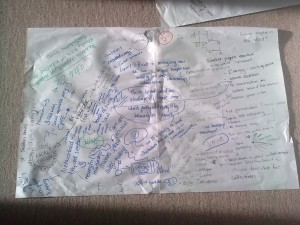Think Global, Be Networked – 2012 symposium discussion
Here is a summary of this Happy Museum Paper principle at the symposium
?Think global, act local’, should be a guide for museums in transition. Whilst most museums might best support well-being in a specific locality, all could increase the extent to which they make international links, use digital tools to reach wider audiences and open their visitors’ eyes to global histories and contemporary issues. Use your networks to deliver this, but use them in reverse too: collect best practice, other models, partners, new ideas, comments, critique and feedback in pursuit of perfection ?
Summary of discussion 13/01/2011
- Feedback from discussion about ?Think global and be networked’
- Think Global and being networked is a ’ Catch 22’ because you need to ?Think globally about the challenge of climate change, whilst addressing it by behaving less globally’
- Current resources for energy (fossil fuels) are finite and near depletion
- There is a need to re-localise society to reduce our impact on the environment e.g. reducing food miles. However, at the same time we do not want to lose the benefits of a global networked culture.
- Network in your local community to link influence and be influenced by the global picture
Principle going forward
1. Personal responsibility
- Need to be mindful of the impact of our own behaviour on the environment, maintain and grow our own networks, learn by sharing our learning and sharing with others.
2. Institutional responsibility
- Museums’ need to be global with purpose, whilst being mindful of impact i.e. National Mining Museum Scotland ?Hand Tools’ project
- Re-localising business practice i.e. Manchester City Council reduced their food miles or Sutton House Café has locally sourced food, cooked by local people.
3. Networking beyond the sector
- Build up relationships across sectors in your local community, share best practice and partner to innovate.
4. Using and developing the tool of the internet to make global connections
- Digital communication technology and internet key to thinking Global and being network
- Important to use yolk of finite fossil fuels to build sustainable international means of communication.
- Digital tools for knowledge and ideas exchange internationally
Case studies:
Here is the case study for the Hand Tools project mentioned above. Sutton House to follow?
http://www.stickssn.org/site/pages/projects/old-tools-new-uses.php


